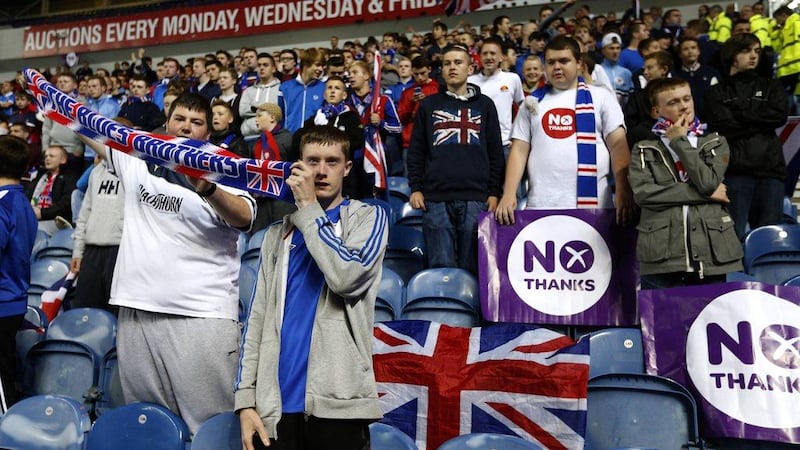The people at Glasgow’s Brazen Head establishment, united in support of the city’s Celtic football club, are split over an independence referendum that has cut across class, religion and even football loyalties.
Patrons wearing “Yes” to independence badges mingled with “No” voters amid the Irish tricolour flags embraced by Celtic, the club beloved of Scotland’s Irish Catholic diaspora.
Owner and keen independence supporter Gian Fraioli, 42, said the historic referendum, which will take place Thursday, had split his customers, with older customers tending towards the “No” camp which wants to retain the United Kingdom.
“Most of the people who come in here would consider themselves Republican. But still some of them saythey’ll vote ‘No’. I don’t understand it,” he said, shaking his head in disbelief.
“I think a lot of friendships have broken up about it. It depends how strongly you feel about it.”
Seated beneath a framed copy of the 1916 Proclamation with which rebels declared “the right of the people of Ireland to the ownership of Ireland”, Catholic Glaswegian pensioner Tony Donnelly, 66, declared his intention to vote “No”.
“I’m voting ‘No’ because I’m voting for the union,” Donnelly said ahead of a match between Celtic and visitors Aberdeen.
“What do flags mean to me? Flags don’t pay the bills.”
Across the city, the other giants of Scottish football are Rangers.
Rivalry between the two clubs has historically acted as a proxy for tensions between Catholics and Protestants, mirroring conflict in neighbouring Northern Ireland, with which Scotland has close cultural links.
Though grandees of both clubs have urged a “No” vote, a May survey showed a lead in support for independence among fans of both Celtic and their “Old Firm” arch-rivals Rangers, who embrace British iconography like the union flag and the royal family.
“Protestants in general are somewhat more likely to be in favour of staying in the union than are Catholics,” said John Curtice, polling expert and politics professor at Strathclyde University.
“Crucially, once you take into the fact that Protestants are older than Catholics and older people in general are less likely to be in favour of independence, the religious difference washes out.”
But Tom Devine, a Scottish historian who has come out in favour of independence, said Catholic voters – many of them descended from Irish immigrants – could help secure a “Yes” victory in Thursday’s vote.
Devine said there had been a “Catholic conversion to independence”.
“They account for nearly a quarter of the electorate, have suffered decades of discrimination and may very well determine the result,” he said.
In increasingly secular Scotland, the fault line on independence may be more economic than religious.
Matches like Saturday’s have been targeted by the Radical Independence Campaign, which casts the independence vote as a grassroots struggle by the working classes to wrest power back from elites, and from a Labour Party that has betrayed its roots.
“Without a shadow of a doubt the working class is for this. We feel we’re up against corporate UK,” 28-year-old Danny McGee said at half-time during the match.
He said the centre-left Labour Party, currently the main opposition group in the British parliament, was “digging its own grave” by campaigning for “No”.
Scotland, long a stronghold of Labour support that the party has at times depended on to form government majorities, could cause a crisis for the party if it breaks away.
During the Celtic-Aberdeen game at Celtic Park, a group of fans held up placards reading “YES” in the 18th minute to mark the date of the referendum.
Supporters flooded away triumphant after a 2-1 victory, passing estates where “Yes” signs and Scottish flags predominated in windows and balconies.
They were met by campaigners from Ireland, who had flown to Glasgow to join Scottish friends in the “Yes” campaign.
“We tell them: we’ve had our ups and downs, but through all our troubles no one would ever want to be ruled by Westminster again,” said Dublin activist Conan O’Broin, 28, as he knocked door-to-door in the surrounding estates.
Follow us on Twitter @SprtNationalUAE





